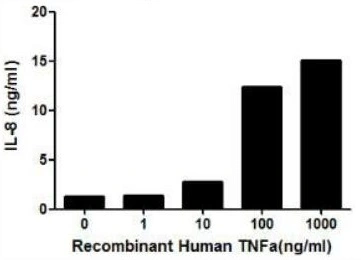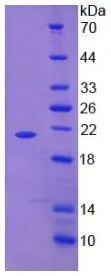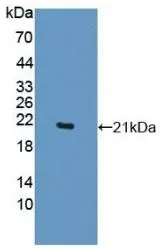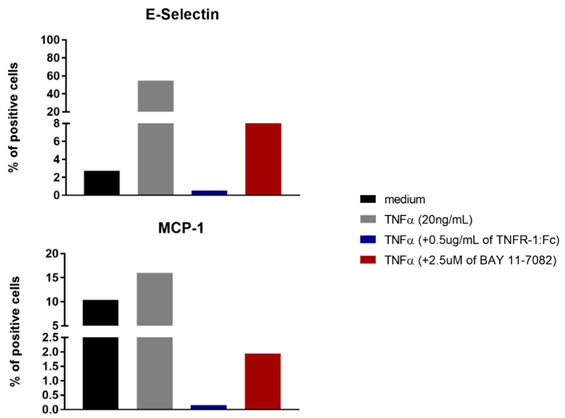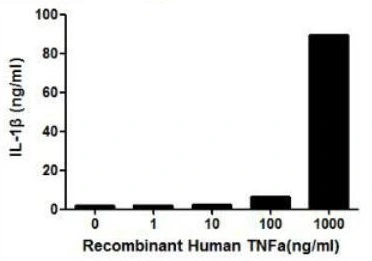
ELISA detection of secreted IL-1 beta activation from A549 cells induced by GTX00102-pro Human TNF alpha protein (active) for 8hrs. Recombinant protein concentrations: 1, 10, 100, and 1000 ng/ml.
Human TNF alpha protein, His tag (active)
GTX00102-PRO
ApplicationsFunctional Assay
Product group Proteins / Signaling Molecules
Protein IDP01375
Overview
- SupplierGeneTex
- Product NameHuman TNF alpha protein, His tag (active)
- Delivery Days Customer9
- Application Supplier NoteTNF-a (Tumor necrosis factor), is mainly secreted by macrophages and can induce cell death of certain tumor cell lines. It has been reported that TNFa can inhibit the proliferation and induce apoptosis of A549 cells, besides, the concentration of IL-1beta and IL-8 in cell supernatant will increase after stimulation. Therefore, a stimulation assay of TNFa was conducted using A549 cells. Briefly, A549 cells were incubated in DMEM with different concentrations of TNFa (1 ng/ml, 10 ng/ml, 100 ng/ml, 1000 ng/ml) for 8h, after which the concentration of IL-1beta in the cell supernatant were detected by ELISA. IL-1beta levels in the cell supernatant of A549 cells increased significantly after stimulation.
- ApplicationsFunctional Assay
- CertificationResearch Use Only
- ConjugateUnconjugated
- Gene ID7124
- Target nameTNF
- Target descriptiontumor necrosis factor
- Target synonymsDIF, IMD127, TNF-alpha, TNFA, TNFSF2, TNLG1F, tumor necrosis factor, APC1 protein, TNF, macrophage-derived, TNF, monocyte-derived, TNF-a, tumor necrosis factor ligand 1F, tumor necrosis factor ligand superfamily member 2, tumor necrosis factor-alpha, tumor necrotic factor alpha
- Protein IDP01375
- Protein NameTumor necrosis factor
- Scientific DescriptionThis gene encodes a multifunctional proinflammatory cytokine that belongs to the tumor necrosis factor (TNF) superfamily. This cytokine is mainly secreted by macrophages. It can bind to, and thus functions through its receptors TNFRSF1A/TNFR1 and TNFRSF1B/TNFBR. This cytokine is involved in the regulation of a wide spectrum of biological processes including cell proliferation, differentiation, apoptosis, lipid metabolism, and coagulation. This cytokine has been implicated in a variety of diseases, including autoimmune diseases, insulin resistance, and cancer. Knockout studies in mice also suggested the neuroprotective function of this cytokine. [provided by RefSeq, Jul 2008]
- Storage Instruction-20°C or -80°C,2°C to 8°C
- UNSPSC41116120
- SpeciesHuman

